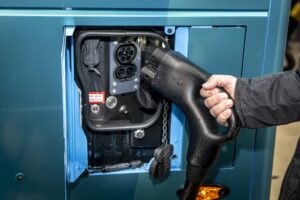Government faces calls for new Clean Air Act
Four separate parliamentary committees have taken the unprecedented step of calling for a new Clean Air Act, after warning pollution is now a ‘national health emergency’.
A report jointly published today by four committees claims the government is more concerned with ‘box-ticking’ than taking bold, affirmative action to tackle the issue.
The environment food and rural affairs, environmental audit, health and social care and transport committees have also accused the government of failing to demonstrate national leadership.
In particular, the report calls on the automobile industry to contribute to a new clean air fund, based on the ‘polluter pays’ principle.
It also recommended manufacturers bring forward the date when they end the sale of conventional petrol and diesel cars.
And it calls on the government to introduce a Clean Air Act to enshrine the right to clean air in British law.
The report also recommends ministers launch a new nationwide health campaign to highlight the dangers of air pollution.
‘The government’s latest plan does not present an effective response to the scale of the air quality catastrophe in the UK,’ said the chair of the environment, food and rural affairs committee, Neil Parish.
‘We are concerned that the government is treating air quality as a box-ticking exercise.
‘Bold, meaningful action.’
‘Real change will require bold, meaningful action. We are calling on the government to develop a properly-resourced support scheme available to all councils struggling with air quality, and to require manufacturers of polluting vehicles to pay their fair share by contributing to an industry financed clean air fund.’
The report comes just weeks after the government was defeated for the third-time running in the High Court by the campaigning group ClientEarth over its air pollution plans.
In a landmark decision, High Court judges said the government’s failure to require action from 45 local authorities with illegal levels of air pollution in their area was ‘unlawful’.
Responding to today’s report, the Local Government Association’s environment spokesperson, Cllr Martin Tett said: ‘The committees are right to recognise the unique position of individual councils to understand the causes of air quality issues in their area, which is why they need the flexibility to deliver their own plans to improve air quality in their community.
‘This is particularly important with regard to clean air zones as well as expanded road and traffic measures.
‘Councils agree with the committees that the 2040 target set by the government for the end of the sale of conventionally-fuelled vehicles is too far away to tackle a public health problem that is shortening lives now,’ added Cllr Tett.
‘It cannot overlook the immediate measures that could have drastic improvements on public health in areas where air quality problems are at their most severe.’
And a government spokesperson said: ‘Air pollution has improved significantly since 2010, but we recognise there is more to do.
‘We have put in place a £3.5bn plan to improve air quality and reduce harmful emissions, will end the sale of conventional new diesel and petrol cars and vans by 2040, and later this year we will publish a comprehensive clean air strategy which will set out further steps to tackle air pollution.’















